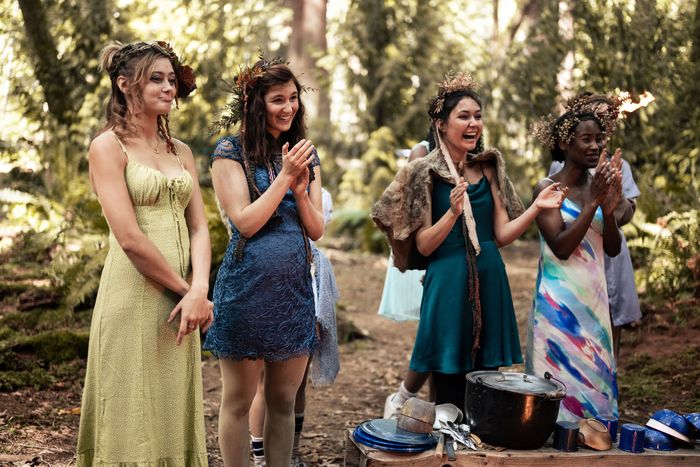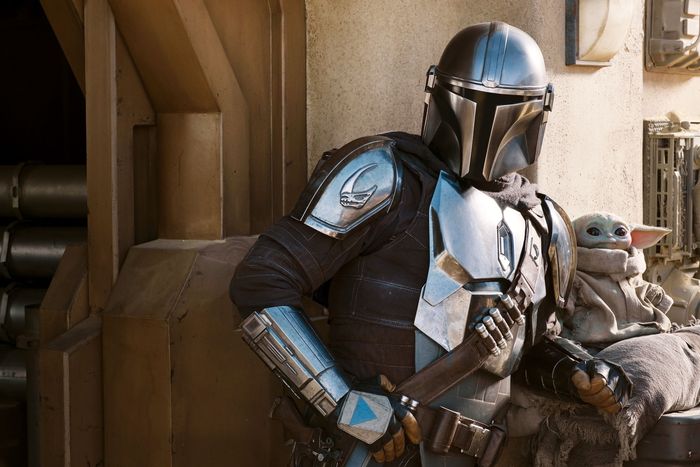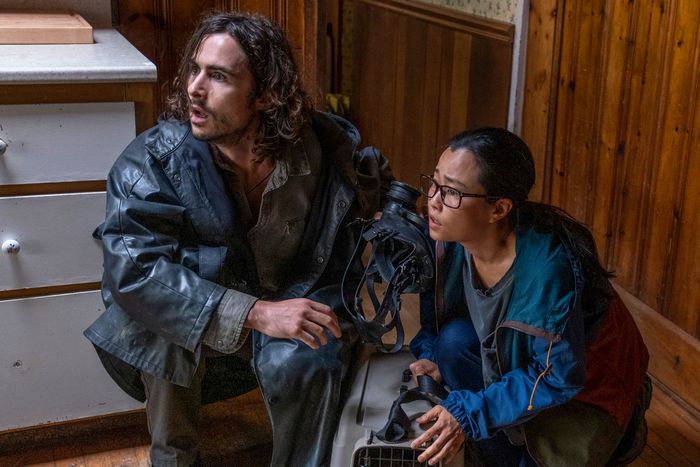
This article was featured in One Great Story, New York’s reading recommendation newsletter. Sign up here to get it nightly.
Maybe Yellowjackets has not yet infiltrated all of your cultural conversations, but we promise: It’s coming. The new Showtime drama, which wraps its first season this month, swiftly moved from an under-the-radar series to a TV Twitter favorite over the past several weeks. It’s fueled by the show’s Lost-y twists and ambiguously supernatural witchy energy, but it’s also the result of a relatively recent trend in TV: weekly releases. Three years ago, when Game of Thrones ended, it felt like the end of an era. The Netflix model had won! The wave of the future would be all-at-once binge releases!
But over the past year, there has been a slow return to weekly release schedules. Some outlets like HBO and Showtime never left, but Disney+ has made it clear it prefers a weekly schedule for its original TV series like The Mandalorian and WandaVision, and Amazon Prime has recently shifted away from binge seasons. It’s an exciting change for people who love to get together and talk about TV once a week, but maybe — maybe? — it will also mean a renewed investment in stronger TV storytelling. Maybe?! Alison Willmore and Kathryn VanArendonk are here to talk it out.
Alison Willmore: Like any mystery worth its salt (and harboring aspirations for a five-year run), Yellowjackets has raised more questions than its upcoming season finale can possibly address. Among the most pressing for me, personally, are the following: Is deposed queen bee Jackie going to get ritualistically eaten? Is dreamy artist Adam actually Javi all grown up, and wouldn’t Shauna recognize him if so? And of course, will another ’90s star be added to the cast to play a present-day version of one of the girls we don’t yet know is still alive, and can it please be Robin Tunney?
But hovering above all these inquiries about what will happen on the show is an equally intriguing one about how we’ve been watching it. Namely: Would we even be talking about Yellowjackets this way if it weren’t getting a weekly release?
And Kathryn, it seems pretty clear to me that the answer is no. Yellowjackets, with its mix of survivalist dread, poisoned nostalgia, kicking ’90s tunes, and delightful performances, would still be a plenty compelling watch when binged over a weekend, and I’m sure plenty of viewers will experience it that way. But it seems inarguable to me that the series has benefited from getting a traditional weekly release. In part, this is because of its puzzle box construction and the fact that there’s more space for theorizing when the whole season hasn’t already all been laid out to watch. But Yellowjackets has also been a genuine word-of-mouth phenomenon, building buzz (sorry) episode by episode and gathering viewers as it has unfolded. In an era when shows and movies seem to barely manage to break through before being pushed aside by whatever’s new, and when Netflix is so dominant that other platforms have to really fight for attention at all, Yellowjackets has sustained a conversation all while airing on Showtime.
It’s not the only series to have done well off a release pattern that was starting to seem practically retro. HBO’s Mare of Easttown definitely accrued an audience and urgency over its seven-episode run, The Mandalorian was an old-fashioned serial in ways that weren’t just about its aesthetic, and Succession has swept more and more viewers up in its horse race of horrible people. Were we too quick to accept that binge-viewing is the future of television? Are we tipping back toward the way things were?
Kathryn VanArendonk: I hope we are! I am old enough, and have been doing this long enough, to remember some of the earliest Netflix binge seasons — House of Cards and Orange Is the New Black. They got plenty of attention, but the trouble of the binge season, which is obvious in a kind of amorphous way to lots of viewers, was instantly very clear to people writing about TV at the time because there was a simple pragmatic problem: When do you post the recaps? Do you put them up all at once? Do you drag them out over a couple days? A week? How do you deal with posts about spoilers and endings? When is fair game?
That’s an extremely tiny problem for a small group of people, but it’s not hard to see the way it magnifies a much broader problem for the binge as a release model. I remember thinking that eventually we’d figure out a norm, a socially accepted rhythm for how and when to talk about all-at-once season releases. And we … never did. Sure, we’ve been muddling along okay, and lots of binge seasons have still become genuine TV phenomena over the last several years (Stranger Things! Selling Sunset!). But once we gave up enforced, serial audience synchrony, we never figured out how to get it back. We never found a way to replace the way weekly releases can shape conversations, hold people’s attention for more than a weekend at a time, and establish a communal experience. Serialization as a form is not just dividing something into small parts; it’s about harnessing those installments to the audience’s own, extra-fictional experience of time. When TV is serialized, the whole audience gets to live alongside it for a while.
So sure, serialization lets stories become part of the fabric of our lives, and that’s something we’ve always craved — especially now, in isolation during a pandemic, it’s no wonder we want shared experiences. Even still, it’s been hard not to look at the TV landscape with Netflix-shaped glasses for the past several years. When Game of Thrones ended, the widespread belief was that we’d never see something like it again. But this past year, watching shows like Yellowjackets and Mare and WandaVision pop up into general awareness and then stick? For weeks? You can almost picture how a Game of Thrones could actually happen again, and not just in the shape of the endless Wheel of Time–esque knockoffs.
A.W.: Oh, man, I’m also old enough to remember those earliest Netflix originals, and around the time, there were a lot of variations on that dreaded statement, “This is more like a 13-hour movie.” A tiresome remnant of the old idea that television is a lesser medium but also a surefire sign that someone had probably made bad TV. There’s a reason the standard run time of a movie is not the length of a workday, and it’s because almost no one can pull off something that feels like it’s meant to be ingested as one uninterrupted dozen-plus-hour whole. Instead, what “a 13-hour movie” often meant was that someone had disregarded the art of episodic structure and slapped some end and starting credits up after enough time had passed. If the full-season drop had a way of making episodes feel arbitrary — created for a release pattern and time-slot boundaries that no longer applied — it also demonstrated the value of actual serialized storytelling and of installments that had their own arcs in addition to being part of a larger season-long one.
That formlessness still plagues a lot of binge-era shows. I don’t think it’s a mistake that one thing the weekly release shows we’re talking about have in common is that they have been very much crafted to play well as discrete episodes in addition to building toward something bigger. WandaVision was in some ways even about the idea of sitcom structure, about A plots and B plots and the comfort and derangement of returning right back to where you began at the end of an episode. There’s something reassuring about seeing shows succeed by leaning into qualities that are particular to television instead of trying to abandon them.
K.V.A.: I’m just over here holding up a giant sign that reads “Yes! Yes, television!”
As a longtime fan of episodic structure, the return to weekly releases and their coincidence with better, tighter TV storytelling is both welcome and expected. One thing I hadn’t really anticipated, but which I do think may also prove true, is the way weekly release television can resist another pernicious, frustrating element of the Netflix problem: It’s anti-algorithmic. The increasingly tiny content niches Netflix has created and served its subscribers have been so corrosive for TV storytelling and for TV viewers. You only get shown the series Netflix already thinks you’re going to like; by the same token, so many Netflix original series feel like subpar box-checking exercises to fill predetermined viewer preferences. But it was fascinating to watch so many people stick with WandaVision even though they didn’t think the beginning was superhero-y enough, or conversely, to see Marvel skeptics make space for a show because they’d heard it was doing something different. This is just guessing, but based on lots of conversations I had last year, people picked up Mare of Easttown who might otherwise have not signed up for a dark prestige mystery because they kept hearing it was good week after week.
Yellowjackets is much, much scarier than most shows I gravitate toward. My Netflix account knows I have an aversion to horror; there is zero way Yellowjackets would’ve ever shown up as a suggested viewing for me on the Netflix homepage. But its dominance in the TV discourse over the past several weeks has made it required viewing, and guess what? Sometimes we like things that don’t look like our favorite familiar genres. Sometimes good TV transcends the ever-more-specific content categories associated with our data-scraped account information.
A.W.: Yeah, I’ve done a lot of harping on what algorithmic recommendations are doing to what we watch, but I still don’t think we’ve really reckoned with what it means when we’re now steered this efficiently toward consuming the same sort of thing again and again because of something we’ve liked, or at least watched, in the past. Your point about the genre-busting aspects of some of these series is a great insight. The shift toward both bingeing and trying to contend with a constant barrage of (often lousy) content tends to make us lazier about what we sample because there’s always more in whatever your chosen comfort zone might be. Keeping up has created its own kind of panicky FOMO, and what these talked-about series achieve is the more manageable allure of tuning in because you’ve heard something is good rather than just, you know, new.
You can really feel the stresses the attention economy is placing on the entertainment industry, and I’m very interested in — not to mention worried about — how idiosyncratic and personal work can break through at a time when there are so many things always vying for everyone’s focus. The swing back toward the weekly release model reminds me of why I think theatrical releases for movies aren’t going away anytime soon. It’s not just the whole “big screen, being alone together in the dark” romanticism, though that of course has its pull. Movies that get a theatrical release, then hit VOD and cable, and then finally are made available for streaming feel like they have a chance at a much bigger cultural footprint than things that are sent to streaming without passing go.
As much as we’re taught that consumer demand is king, and that everyone should get what they want in the form they want it, there’s an advantage to having a more drawn-out cultural conversation. I don’t think everyone loves to hear that, and certainly they’ve been fandom tantrums — Kathryn, you’re the one who told me about what happened with Amazon’s The Boys after a first season that definitely gathered steam with a gradual rollout. But I believe, despite the impatience that longer release schedules can create in viewers, those schedules also send a message that something is more valuable — if that makes any sense? It’s not just content to be extruded by tubes onto our devices.
K.V.A.: A weekly release was once a reflection of the simple reality of TV technology. In a system with three networks and a prime-time programming grid, having a broadcast slot was the point of scarcity. One episode a day, or one episode a week, was all the grid could give you time for. Now, when streaming means that the programming grid goes to infinity, the scarcity logic changes. A weekly release is a claim about the show. It’s an implicit suggestion that you only need one episode at a time for it to be good and that having a little and then being forced to wait will improve your experience. The show is worth your attention now and will continue to be worth your attention in a month and will stay that way even another month later. But it’s also become kind of an entertainment marshmallow test. You could just wait and binge The Boys all at once when it’s done with its full season! Or you eat that tasty violent marshmallow now and then throw a giant fit when you don’t get instant access to the whole bag.
Weekly releases have not suddenly become unmitigated successes, though. The same thing that plagued them before plagues them still: They can accelerate through word-of-mouth, but good shows can also completely fail to capture enough attention. Last year’s adaptation of Y: The Last Man was a good example: intriguing premise, highly anticipated adaptation, slow-burn character development, thoughtful production that got stronger as the season went. And yet it could not capture the buzz necessary to reach an audience outside the small group who were already going to check it out. There was a similar situation with FX’s Impeachment: American Crime Story, which was further hampered by its inaccessibility on streaming. (Yet at the same time it’s nearly impossible to watch Yellowstone, and that hasn’t stopped 10 million people.)
The broader point is that weekly releases have not become overnight slam dunks and binge releases have not suddenly died off, but it does feel like everything is much more fluid than it was even two years ago. Maybe the new default model will be whatever HBO Max is doing. Three episodes one week, then two the next, then maybe three again, and then one! Who knows!
A.W.: Yeah, for all that we’ve become untethered from a lot of the structures that used to dictate what TV had to look like, we still haven’t strayed that far in terms of format. Hell, I’ve been waiting for shows to get weirder with episode length, but so far The Underground Railroad is the only one I can think of that really loosed itself from regular run times. You’re right that even the binary of week by week versus all at once is narrow in its thinking when the way we watch is always changing and new platforms are more limber in trying out different approaches to see what sticks.
That said, I’ve been loving the traction that these select weekly releases have been getting, and the conversation they’ve been enabling, because everyone being roughly on the same page fosters a sense of communal viewing even if those discussions now mostly happen online rather than around a theoretical watercooler. The disruption of film and television has been driven by convenience, by giving people more ways to watch things on their own time and on their chosen screen, but that’s come at the expense of a shared experience.
We’re never going back to the era when 72 percent of television-owning American households tuned in to watch Lucy and Ricky Ricardo have a baby. The closest we’ve come lately is Squid Game — and while I don’t understand the fantastic alchemy that powered a bleak South Korean survival drama to such massive success, I also have to wonder how the show might have gone over if it had had a chance to build an audience over a longer stretch of time. Even if everything is niche now (and more varied and rich for it!), that desire to get together and dissect what happened on the latest episode of something good hasn’t gone away, and we shouldn’t discount the appeal of that aspect of viewing.
K.V.A.: I’m tentatively (oh, so tentatively) optimistic about this course correction — if not fully back to a weekly broadcast TV schedule then at least away from “Here’s ten hours of TV, good luck” as the default expectation for what TV should be. It’s not just the conversation serialization creates, although that’s a huge part of it. I do also believe that when creators know they’re heading toward a weekly version or some kind of serialized release, the TV is better. It’s not true in every case, and there are plenty of shows that get developed as one thing and end up another. (I also think there are headwinds from the metaverse model that dampen some of that effect for the Marvel / Star Wars series.)
Still, I vastly prefer that feeling of lots of people watching TV together over … most other feelings, if I’m honest. It has always been the great thing about TV as a form, and I’m hopeful that this won’t be a short-lived trend. Wouldn’t it be nice to share TV together again?
More From This Series
- Yellowjackets Recap: The Bridge Home
- Yellowjackets Recap: Serious Karma Deficit
- Yellowjackets Recap: Girls’ Trip



